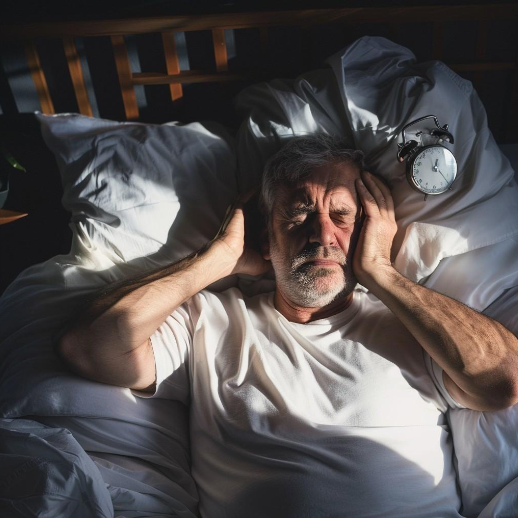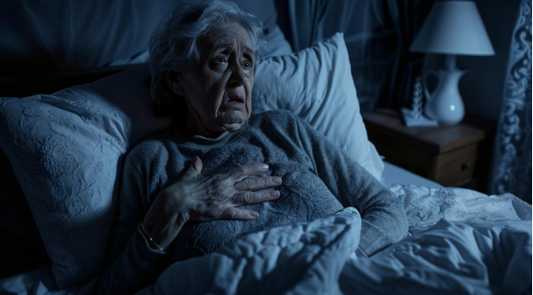Aging and Sleep: How Herbal Supplements Can Manage Insomnia Help
As we age, sleepless nights often become a common struggle. Many older adults experience insomnia, leaving them feeling drained and irritable. This can affect not just overall health but also enjoyment of life.
Fortunately, herbal supplements are gaining attention as a natural way to improve sleep quality. They offer a potential solution for those looking to manage insomnia without heavy medications. In this post, we’ll explore how these herbal remedies work and why they might be a helpful option for you or a loved one experiencing sleep issues. You'll also learn about specific herbs that have shown promise in promoting restful nights. Get ready to uncover valuable insights that could enhance your approach to sleep as you age.
Understanding Insomnia in Aging
As people age, sleep becomes an increasingly important topic. Sleep patterns shift, and many older adults find themselves struggling with insomnia. Understanding the reasons behind insomnia can help in managing its effects. Everyone deserves a good night's sleep, and knowing what causes sleep disturbances can lead to effective solutions.
Common Causes of Insomnia in Seniors
Several factors can contribute to insomnia in older adults. Here are some of the most common causes:
- Changes in Circadian Rhythms: As we age, our body's internal clock changes. Seniors often experience an earlier sleep onset and wake-up time, which may not align with their lifestyle. This shift can lead to difficulties in falling asleep or staying asleep.
- Medications: Many older adults take medications for various health conditions. Some of these medications can interfere with sleep. Common culprits include certain blood pressure medications, antidepressants, and corticosteroids. It's essential to review medication lists with healthcare professionals to identify potential sleep disruptors.
- Health Conditions: Chronic health issues can impact sleep quality. Conditions like arthritis, diabetes, and heart disease can cause discomfort, making it challenging to enjoy restful sleep. Additionally, mental health issues like depression and anxiety can create a cycle of insomnia that can be tough to break.
- Lifestyle Factors: Limited physical activity, poor diet, and irregular sleep schedules can all contribute to insomnia. Engaging in light exercise and maintaining a consistent sleep routine can help improve sleep.
Understanding these causes can empower older adults to take proactive steps toward better sleep.
Impact of Insomnia on Health
Chronic insomnia does more than just make you feel tired. It can lead to serious health consequences:
- Cognitive Decline: Lack of sleep affects memory and cognitive function. Seniors may find it harder to concentrate or recall information, impacting daily activities and social interactions.
- Physical Health: Sleep deprivation can weaken the immune system, making it easier for illnesses to take hold. It can also contribute to weight gain and increase the risk of conditions like heart disease and diabetes.
- Mood Changes: Insomnia can lead to irritability and mood swings. This emotional toll can harm relationships and social interactions, making it hard for seniors to enjoy life fully.
- Daily Life Disruptions: Poor sleep can affect a senior's ability to perform common tasks. Activities like driving, cooking, and even social outings can become challenging when one is sleep-deprived.
In summary, insomnia is not just a nuisance; it can significantly impact overall well-being and quality of life. Recognizing the causes and effects of insomnia can help older adults seek appropriate treatment and improve their sleep habits. Everyone deserves restful nights, and understanding these aspects is the first step towards achieving them.
Herbal Supplements for Sleep Management
Herbal supplements provide a natural option for those struggling with insomnia. Unlike prescription medications, these herbs often come with fewer side effects and can promote a sense of calm and relaxation. But how exactly do they work? Many herbal supplements can enhance the body’s ability to fall asleep by addressing stress, anxiety, or restlessness. Here are some popular choices that might help improve sleep quality.
Valerian Root
Valerian root has been a popular sleep aid for centuries. Known for its calming effects, it can help you fall asleep faster and improve overall sleep quality. This herb contains compounds that may increase the levels of gamma-aminobutyric acid (GABA) in the brain, a neurotransmitter that regulates relaxation.
- Efficacy: Several studies have shown that valerian root can effectively reduce the time it takes to fall asleep. Users often report feeling more rested and alert the next day.
- Potential Side Effects: While generally considered safe, some people may experience dizziness, headaches, or digestive issues. It’s wise to consult with a healthcare provider before trying valerian root, especially if you’re on other medications.
Chamomile
Chamomile is widely recognized for its soothing properties. Often consumed as tea, it has been used for centuries to help promote relaxation and sleep.
- Calming Properties: Chamomile contains antioxidants that may aid in reducing anxiety and promoting sleep. Its mild sedative effects can make it easier to unwind after a long day.
- Methods of Consumption: The most common way to enjoy chamomile is as a tea. Simply steep chamomile flowers in hot water for about 5-10 minutes. Other forms include capsules, extracts, or essential oils, which can also be effective.
Lavender
Lavender is well-known for its aromatic qualities and is frequently used in aromatherapy to promote better sleep.
- Enhancing Sleep Quality: The scent of lavender can have a calming effect on the nervous system. Research suggests that inhaling lavender essential oil may lead to deeper, more restorative sleep.
- Aromatherapy Use: To use lavender for sleep, consider placing a diffuser in your bedroom. Alternatively, you can apply diluted lavender oil to your pillow or add a few drops to your bath before bed. The soothing aroma creates a peaceful atmosphere, making it easier to drift off.
Exploring these herbal supplements may offer a pathway to better sleep without the drawbacks of traditional medications. As always, be attentive to how your body reacts and consult healthcare professionals for personalized advice.
Safety and Considerations
When exploring herbal supplements for managing insomnia, safety should be your top priority. It’s essential to grasp how these natural remedies can interact with other medications and the right way to use them. Not all herbal supplements are safe for everyone, especially for older adults who may have unique health concerns. Always keep in mind, a well-informed approach can lead to better sleep and overall well-being.
Potential Interactions with Medications
Before adding any herbal supplement to your routine, consulting with a healthcare professional is crucial. Just like mixing certain ingredients in cooking can spoil a dish, combining herbal supplements with medications can lead to unwanted side effects.
Some herbs can enhance or block the effects of prescription drugs. Here are a few key points to consider:
- Blood Thinners: Supplements like Ginkgo Biloba may increase bleeding risk when taken with blood thinners.
- Antidepressants: Valerian root, often used for sleep, may interact negatively with certain antidepressants.
- Other Medications: Always inform your doctor about any herbal products you take, especially if you are on medications for heart conditions, diabetes, or epilepsy.
By discussing your supplement choices with your healthcare provider, you can avoid complications and ensure that your chosen remedies work for you, not against you.
Dosage and Administration
Using herbal supplements effectively requires understanding the right dosage and administration methods. Just like a recipe needs precise measurements, the right amount of herbal supplements is vital for safety and success. Here are some guidelines for safe use:
- Start Small: Begin with a lower dose to see how your body reacts. This minimizes the risk of side effects.
- Follow the Label: Always read product labels for dosage instructions. Each supplement may have different recommendations.
- Keep a Consistent Schedule: Take supplements at the same time each day to create a routine that supports better sleep habits.
- Consult a Professional: Discuss any changes or increases in dosage with a healthcare provider. They can advise you based on your health status.
Remember, the goal is not just to sleep better but to do so safely. Be cautious, and always put your health first when considering herbal supplements.
Understanding how aging affects sleep is crucial for older adults struggling with insomnia. Herbal supplements can offer a natural approach to managing sleeplessness, potentially improving both sleep quality and overall well-being.
It's vital to remember that not all supplements work the same for everyone. Consulting a healthcare provider before starting any new regimen ensures safety and effectiveness tailored to individual needs.
As you explore natural sleep aids, consider how these options fit into your lifestyle. What has been your experience with sleep and herbal remedies? Share your thoughts, and let's continue the conversation!
P.S.
If you are having difficulty with sleeping, you are not alone. There are many folks out there who want to know what the most effective natural sleep aid is to get them back to snoozing again. Fix My Sleep is a great resource for all those who have trouble sleeping and are looking for innovative tips and sleep products to help them get a good night’s sleep.





